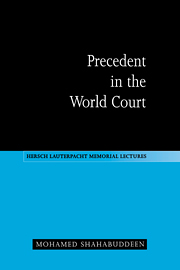Book contents
- Frontmatter
- Contents
- Foreword
- Preface
- List of abbreviations
- 1 Introduction
- 2 The growth of the Court's case law
- 3 Range of precedential resources
- 4 The bases of the system
- 5 The Advisory Committee of Jurists
- 6 The view taken by the League of Nations
- 7 The possibility of judge-made international law
- 8 Stare decisis
- 9 Distinguishing
- 10 Departing from a previous decision
- 11 Ratio decidendi and obiter dictum
- 12 Advisory opinions and decisions of chambers
- 13 The precedential impact of individual opinions
- 14 Effect and scope of the Court's case law
- 15 Conclusion
- Index
14 - Effect and scope of the Court's case law
Published online by Cambridge University Press: 04 May 2010
- Frontmatter
- Contents
- Foreword
- Preface
- List of abbreviations
- 1 Introduction
- 2 The growth of the Court's case law
- 3 Range of precedential resources
- 4 The bases of the system
- 5 The Advisory Committee of Jurists
- 6 The view taken by the League of Nations
- 7 The possibility of judge-made international law
- 8 Stare decisis
- 9 Distinguishing
- 10 Departing from a previous decision
- 11 Ratio decidendi and obiter dictum
- 12 Advisory opinions and decisions of chambers
- 13 The precedential impact of individual opinions
- 14 Effect and scope of the Court's case law
- 15 Conclusion
- Index
Summary
Some practical effects
The jurisprudential importance which the Court attaches to its previous decisions was discussed in chapter 2. The practical consequences have to be borne in mind in considering the proper scope of its case law. New cases sometimes influence the development of State practice. As illustrations, D. J. Harris cites the Fisheries case, the Reservations case and the Reparation case. The speed with which the jurisprudence of the Fisheries case was translated into the provisions of the 1958 Geneva Convention on the Territorial Sea and the Contiguous Zone may be recalled. The development had been anticipated in a general sense; in his speech before the Court, Attorney General Sir Frank Soskice had observed:
It is common ground that this case is not only a very important one to the United Kingdom and to Norway, but that the decision of the Court on it will be of the very greatest importance to the world generally as a precedent, since the Court's decision in this case must contain important pronouncements concerning the rules of international law relating to coastal waters. The fact that so many governments have asked for copies of our Pleadings in this case is evidence that this is the general view.
- Type
- Chapter
- Information
- Precedent in the World Court , pp. 209 - 233Publisher: Cambridge University PressPrint publication year: 1996

